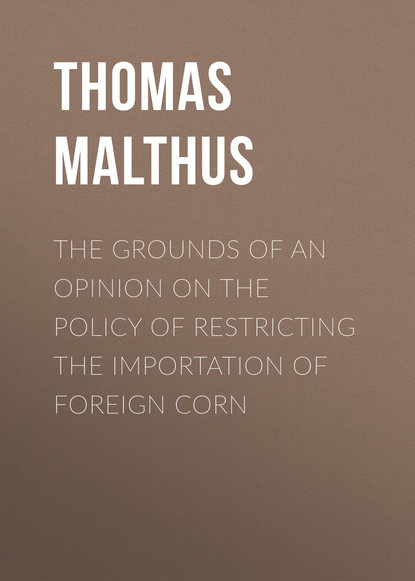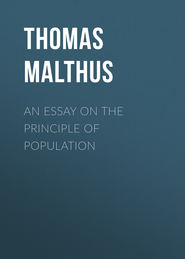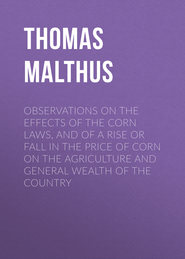По всем вопросам обращайтесь на: info@litportal.ru
(©) 2003-2025.
✖
The Grounds of an Opinion on the Policy of Restricting the Importation of Foreign Corn
Автор
Год написания книги
2019
Настройки чтения
Размер шрифта
Высота строк
Поля
Our commerce and manufactures, therefore, must increase very considerably before they can restore the demand for labour already lost; for the and a moderate increase beyond this will scarcely make up disadvantage of a low money price of wages.
These wages will finally be determined by the usual money price of corn, and the state of the demand for labour.
There is a difference between what may be called the usual price of corn and the average price, which has not been sufficiently attended to. Let us suppose the common price of corn, for four years out of five, to be about L2 a quarter, and during the fifth year to be L6. The average price of the five years will then be L2 16s.; but the usual price will still be about L2, and it is by this price, and not by the price of a year of scarcity, or even the average including it, that wages are generally regulated.
If the ports were open, the usual price of corn would certainly fall, and probably the average price; but from at has before been said of the existing laws of France, and of the practice among the Baltic nations of raising the tax on their exported corn in proportion to the demand for it, there is every reason to believe, that the fluctuations of price would be much greater. Such would, at least, be my conclusion from theory; and, I think, it has been confirmed by the experience of the last hundred years. During this time, the period of our greatest importations, and of our greatest dependence upon foreign corn, was from 1792 to 1805 inclusive; and certainly in no fourteen years of the whole hundred were the fluctuations of price so great. In 1792 the price was 42s. a quarter; in 1796, 77s.; in 1801, 118s. a quarter; and, in 1803, 56s. Between the year 1792 and 1801 the rise was almost a triple, and in the short period from 1798 to 1803, it rose from 50s. to 118s. and fell again to 56s.[13 - I am strongly disposed to believe, that it is owning to the unwillingness of governments to allow the free egress of their corn, when it is scarce, that nations are practically so little dependent upon each other for corn, as they are found to be. According to all general principles they ought to be more dependent. But the great fluctuations in the price of corn, occasioned by this unwillingness, tend to throw each country back again upon its internal resources. This was remarkably the case with us in 1800 and 1801, when the very high price, which we paid for foreign corn, gave a prodigious stimulus to our domestic agriculture. A large territorial country, that imports foreign corn, is exposed not infrequently to the fluctuations which belong to this kind of variable dependence, without obtaining the cheapness that ought to accompany a trade in corn really free.]
I would not insist upon this existence as absolutely conclusive, on account of the mixture of accident in all such appeals to facts; but it certainly tends to confirm the probability of those great fluctuations which, according to all general principles, I should expect from the temper and customs of nations, with regard to the egress of corn, when it is scarce; and particularly from the existing laws of that country, which, in all common years, will furnish us with a large proportion of our supplies.
To these causes of temporary fluctuations, during peace, should be added the more durable as well as temporary, fluctuations occasioned by war. Without reference to the danger of excessive scarcity from another combination against us, if we are merely driven back at certain distant intervals upon our own resources, the experience of the present times will teach us not to estimate lightly the convulsion which attends the return, and the evils of such alternations of price.
In the Observations, I mentioned some causes of fluctuations which would attend the system of restrictions; but they are in my opinion inconsiderable, compared with those which have been just referred to.
On the labouring classes, therefore, the effects of opening our ports for the free importation of foreign corn, will be greatly to lower their wages, and to subject them to much greater fluctuations of price. And, in this state of things, it will require a much greater increase in the demand for labour, than there is in any rational ground for expecting, to compensate to the labourer the advantages which he loses in the high money wages of labour, and the steadier and less fluctuating price of corn.
2. Of the next most important class of society, those who live upon the profits of stock, one half probably are farmers, or immediately connected with farmers; and of the property of the other half, not above one fourth is engaged in foreign trade.
Of the farmers it is needless to say anything. It cannot be doubted that they will suffer severely from the opening of the ports. Not that the profits of farming will not recover themselves, after a certain period, and be as great, or perhaps greater, than they were before; but this cannot take place till after a great loss of agricultural capital, or the removal of it into the channels of commerce and manufactures.
Of the commercial and manufacturing part of the society, only those who are directly engaged in foreign trade, will feel the benefit of the importing system. It is of course to be expected, that the foreign trade of the nation will increase considerably. If it do not, indeed, we shall have experienced a very severe loss, without anything like a compensation for it. And if this increase merely equals the loss of produce sustained by agriculture, the quantity of other produce remaining the same, it is quite clear that the country cannot possibly gain by the exchange, at whatever price it may buy or sell. Wealth does not consist in the dearness or cheapness of the usual measure of value, but in the quantity of produce; and to increase effectively this quantity of produce, after the severe check sustained by agriculture, it is necessary that commerce should make a very powerful start.
In the actual state of Europe and the prevailing jealousy of our manufactures, such a start seems quite doubtful; and it is by no means impossible that we shall be obliged to pay for our foreign corn, by importing less of other commodities, as well as by exporting more of our manufactures.
It may be said, perhaps, that a fall in the price of our corn and labour, affords the only chance to our manufacturers of retaining possession of the foreign markets; and that though the produce of the country may not be increased by the fall in the price of corn, such a fall is necessary to prevent a positive diminution of it. There is some weight undoubtedly in this argument. But if we look at the probable effects of returning peace to Europe, it is impossible to suppose that, even with a considerable diminution in the price of labour, we should not lose some markets on the continent, for those manufactures in which we have no peculiar advantage; while we have every reason to believe that in others, where our colonies, our navigation, our long credits, our coals, and our mines come in question, as well as our skill and capital, we shall retain our trade in spite of high wages. Under these circumstances, it seems peculiarly advisable to maintain unimpaired, if possible, the home market, and not to lose the demand occasioned by so much of the rents of land, and of the profits and capital of farmers, as must necessarily be destroyed by the check to our home produce.
But in whatever way the country may be affected by the change, we must suppose that those who are immediately engaged in foreign trade will benefit by it. As those, however, form but a very small portion of the class of persons living on the profits of stock, in point of number, and not probably above a seventh or eighth in point of property, their interests cannot be allowed to weigh against the interests of so very large a majority.
With regard to this great majority, it is impossible that they should not feel very widely and severely the diminution of their nominal capital by the fall of prices. We know the magic effect upon industry of a rise of prices. It has been noticed by Hume, and witnessed by every person who has attended to subjects of this kind. And the effects of a fall are proportionately depressing. Even the foreign trade will not escape its influence, though here it may be counterbalanced by a real increase of demand. But, in the internal trade, not only will the full effect of this deadening weight be experienced, but there is reason to fear that it may be accompanied with an actual diminution of home demand. There may be the same or even a greater quantity of corn consumed in the country, but a smaller quantity of manufactures and colonial produce; and our foreign corn may be purchased in part by commodities which were before consumed at home. In this case, the whole of the internal trade must severely suffer, and the wealth and enjoyments of the country be decidedly diminished. The quantity of a country's exports is a very uncertain criterion of its wealth. The quantity of produce permanently consumed at home is, perhaps, the most certain criterion of wealth to which we can refer.
Already, in all the country towns, this diminution of demand has been felt in a very great degree; and the surrounding farmers, who chiefly support them, are quite unable to make their accustomed purchases. If the home produce of grain be considerably diminished by the opening of our ports, of which there can be no doubt, these effects in the agricultural countries must be permanent, though not to the same extent as at present. And even if the manufacturing towns should ultimately increase, in proportion to the losses of the country, of which there is great reason to doubt, the transfer of wealth and population will be slow, painful, and unfavourable to happiness.
3. Of the class of landholders, it may be truly said, that though they do not so actively contribute to the production of wealth, as either of the classes just noticed, there is no class in society whose interests are more nearly and intimately connected with the prosperity of the state.
Some persons have been of opinion, and Adam Smith himself among others, that a rise or fall of the price of corn does not really affect the interests of the landholders; but both theory and experience prove the contrary; and shew, that, under all common circumstances, a fall of price must be attended with a diminution of produce, and that a diminution of produce will naturally be attended with a diminution of rent.[14 - See this subject treated in An Inquiry into the Nature and Progress of Rents.]
Of the effect, therefore, of opening the ports, in diminishing both the real and nominal rents of the landlords, there can be no doubt; and we must not imagine that the interest of a body of men, so circumstanced as the landlords, can materially suffer without affecting the interests of the state.
It has been justly observed by Adam Smith, that 'no equal quantity of productive labour employed in manufactures can ever occasion so great a reproduction as in agriculture.' If we suppose the rents of land taken throughout the kingdom to be one fourth of the gross produce, it is evident, that to purchase the same value of raw produce by means of manufactures, would require one third more capital. Every five thousand pounds laid out on the land, not only repays the usual profits of stock, but generates an additional value, which goes to the landlord. And this additional value is not a mere benefit to a particular individual, or set of individuals, but affords the most steady home demand for the manufactures of the country, the most effective fund for its financial support, and the largest disposable force for its army and navy. It is true, that the last additions to the agricultural produce of an improving country are not attended with a large proportion of rent;[15 - Inquiry into the Nature and Progress of Rent.] and it is precisely this circumstance that may make it answer to a rich country to import some of its corn, if it can be secure of obtaining an equable supply. But in all cases the importation of foreign corn must fail to answer nationally, if it is not so much cheaper than the corn that can be grown at home, as to equal both the profits and the rent of the grain which it displaces.
If two capitals of ten thousand pounds each, be employed, one in manufactures, and the other in the improvement of the land, with the usual profits, and withdrawn in twenty years, the one employed in manufactures will leave nothing behind it, while the one employed on the land will probably leave a rent of no inconsiderable value.
These considerations, which are not often attended to, if they do not affect the ordinary question of a free trade in corn, must at least be allowed to have weight, when the policy of such a trade is, from peculiarity of situation and circumstances, rendered doubtful.
4. We now come to a class of society, who will unquestionably be benefited by the opening of our ports. These are the stockholders, and those who live upon fixed salaries.[16 - It is to this class of persons that I consider myself as chiefly belonging. Much the greatest part of my income is derived from a fixed salary and the interest of money in the funds.] They are not only, however, small in number, compared with those who will be affected in a different manner; but their interests are not so closely interwoven with the welfare of the state, as the classes already considered, particularly the labouring classes, and the landlords.
In the Observations, I remarked, that it was 'an error of the most serious magnitude to suppose that any natural or artificial causes, which should raise or lower the values of corn or silver, might be considered as matters of indifference; and that, practically, no material change could take place in the value of either, without producing both temporary and lasting effects, which have a most powerful influence on the distribution of property.'
In fact, it is perfectly impossible to suppose that, in any change in the measure of value, which ever did, or ever can take place practically, all articles, both foreign and domestic, and all incomes, from whatever source derived, should arrange themselves precisely in the same relative proportions as before. And if they do not, it is quite obvious, that such a change may occasion the most marked differences in the command possessed by individuals and classes of individuals over the produce and wealth of the country. Sometimes the changes of this kind that actually take place, are favourable to the industrious classes of society, and sometimes unfavourable.
It can scarcely be doubted, that one of the main causes, which has enabled us hitherto to support, with almost undiminished resources, the prodigious weight of debt which has been accumulated during the last twenty years, is the continued depreciation of the measure in which it has been estimated, and the great stimulus to industry, and power of accumulation, which have been given to the industrious classes of society by the progressive rise of prices. As far as this was occasioned by excessive issues of paper, the stockholder was unjustly treated, and the industrious classes of society benefited unfairly at his expense. But, on the other hand, if the price of corn were now to fall to 50 shillings a quarter, and labour and other commodities nearly in proportion, there can be no doubt that the stockholder would be benefited unfairly at the expense of the industrious classes of society, and consequently at the expense of the wealth and prosperity of the whole country.
During the twenty years, beginning with 1794 and ending with 1813, the average price of British corn per quarter was about eighty-three shillings; during the ten years ending with 1813, ninety-two shillings; and during the last five years of the twenty, one hundred and eight shillings. In the course of these twenty years, the government borrowed near five hundred millions of real capital, for which on a rough average, exclusive of the sinking fund, it engaged to pay about five per cent. But if corn should fall to fifty shillings a quarter, and other commodities in proportion, instead of an interest of about five per cent. the government would really pay an interest of seven, eight, nine, and for the last two hundred millions, ten per cent.
To this extraordinary generosity towards the stockholders, I should be disposed to make no kind of objection, if it were not necessary to consider by whom it is to be paid; and a moment's reflection will shew us, that it can only be paid by the industrious classes of society and the landlords, that is, by all those whose nominal incomes will vary with the variations in the measure of value. The nominal revenues of this part of the society, compared with the average of the last five years, will be diminished one half; and out of this nominally reduced income, they will have to pay the same nominal amount of taxation.
The interest and charges of the national debt, including the sinking fund, are now little short of L40 millions a year; and these L40 millions, if we completely succeed in the reduction of the price of corn and labour, are to be paid in future from a revenue of about half the nominal value of the national income in 1813.
If we consider, with what an increased weight the taxes on tea, sugar, malt, leather, soap, candles, etc., etc. would in this case bear on the labouring classes of society, and what proportion of their incomes all the active, industrious middle orders of the state, as well as the higher orders, must pay in assessed taxes, and the various articles of the customs and excise, the pressure will appear to be absolutely intolerable. Nor would even the ad valorem taxes afford any real relief. The annual fourty millions, must at all events be paid; and if some taxes fail, others must be imposed that will be more productive.
These are considerations sufficient to alarm even the stockholders themselves, indeed, if the measure of value were really to fall, as we have supposed, there is great reason to fear that the country would be absolutely unable to continue the payment of the present interest of the national debt.
I certainly do not think, that by opening our ports to the freest admission of foreign corn, we shall lower the price to fifty shillings a quarter. I have already given my reasons for believing that the fluctuations which in the present state of Europe, a system of importation would bring with it, would be often producing dear years, and throwing us back again upon our internal resources. But still there is no doubt whatever, that a free influx of foreign grain would in all commonly favourable seasons very much lower its price.
Let us suppose it lowered to sixty shillings a quarter, which for periods of three or four years together is not improbable. The difference between a measure of value at 60 compared with 80 (the price at which it is proposed to fix the importation), is 33 1/3 per cent. This percentage upon 40 millions amounts to a very formidable sum. But let us suppose that corn does not effectually regulate the prices of other commodities; and, making allowances on this account, let us take only 25, or even 20 per cent. Twenty per cent. upon 40 millions amounts at once to 8 millions—a sum which ought to go a considerable way towards a peace establishment; but which, in the present case, must go to pay the additional interest of the national debt, occasioned by the change in the measure of value. And even if the price of corn be kept up by restrictions to 80 shillings a quarter, it is certain that the whole of the loans made during the war just terminated, will on an average, be paid at an interest very much higher than they were contracted for; which increased interest can, of course, only be furnished by the industrious classes of society.
I own it appears to me that the necessary effect of a change in the measure of value on the weight of a large national debt is alone sufficient to make the question fundamentally different from that of a simple question about a free or restricted trade; and, that to consider it merely in this light, and to draw our conclusions accordingly, is to expect the same results from premises which have essentially changed their nature. From this review of the manner in which the different classes of society will be affected by the opening of our ports, I think it appears clearly, that very much the largest mass of the people, and particularly of the industrious orders of the state, will be more injured than benefited by the measure.
I have now stated the grounds on which it appears to me to be wise and politic, in the actual circumstances of the country, to restrain the free importation of foreign corn.
To put some stop to the progressive loss of agricultural capital, which is now taking place, and which it will be by no means easy to recover, it might be advisable to pass a temporary act of restriction, whatever may be the intention of the legislature in future. But, certainly it is much to be wished that as soon as possible, consistently with due deliberation, the permanent policy intended to be adopted with regard to the trade in corn should be finally settled. Already, in the course of little more than a century, three distinct changes in this policy have taken place. The act of William, which gave the bounty, combined with the prohibitory act of Charles II was founded obviously and strikingly upon the principle of encouraging exportation and discouraging importation; the spirit of the regulations adopted in 1773, and acted upon some time before, was nearly the reverse, and encouraged importation and discouraged exportation. Subsequently, as if alarmed at the dependence of the country upon foreign corn, and the fluctuations of price which it had occasioned, the legislature in a feeble act of 1791, and rather a more effective one in 1804, returned again to the policy of restrictions. And if the act of 1804 be left now unaltered, it may be fairly said that a fourth change has taken place; as it is quite certain that, to proceed consistently upon a restrictive system, fresh regulations become absolutely necessary to keep pace with the progressive fall in the value of currency.
Such changes in the spirit of our legislative enactments are much to be deprecated; and with a view to a greater degree of steadiness in future, it is quite necessary that we should be so fully prepared for the consequences which belong to each system, as not to have our determinations shaken by them, when they occur.
If, upon mature deliberation, we determine to open our ports to the free admission of foreign grain, we must not be disturbed at the depressed state, and diminished produce of our home cultivation; we must not be disturbed at our becoming more and more dependent upon other nations for the main support of our population; we must not be disturbed at the greatly increased pressure of the national debt upon the national industry; and we must not be disturbed at the fluctuations of price, occasioned by the very variable supplies, which we shall necessarily receive from France, in the actual state of her laws, or by the difficulty and expense of procuring large, and sudden imports from the Baltic, when our wants are pressing. These consequences may all be distinctly foreseen. Upon all general principles, they belong to the opening of our ports, in the actual state and relations of this country to the other countries of Europe; and though they may be counterbalanced or more than counterbalanced, by other advantages, they cannot, in the nature of things, be avoided.
On the other hand, if, on mature deliberation, we determine steadily to pursue a system of restrictions with regard to the trade in corn, we must not be disturbed at a progressive rise in the price of grain; we must not be disturbed at the necessity of altering, at certain intervals, our restrictive laws according to the state of the currency, and the value of the precious metals; we must not be disturbed at the progressive diminution of fixed incomes; and we must not be disturbed at the occasional loss or diminution of a continental market for some of our least peculiar manufactures, owing to the high price of our labour.[17 - It often happens that the high prices of a particular country may diminish the quantity of its exports without diminishing the value of their amount abroad; in which case its foreign trade is peculiarly advantageous, as it purchases the same amount of foreign commodities at a much less expense of labour and capital.] All these disadvantages may be distinctly foreseen. According to all general principles they strictly belong to the system adopted; and, though they may be counterbalanced, and more than counterbalanced, by other greater advantages, they cannot, in the nature of things, be avoided, if we continue to increase in wealth and population.
Those who promise low prices upon the restrictive system, take an erroneous view of the causes which determine the prices of raw produce, and draw an incorrect inference from the experience of the first half of the last century. As I have stated in another place,[18 - Inquiry into the Nature and Progress of Rent.] a nation which very greatly gets the start of its neighbours in riches, without any peculiar natural facilities for growing corn, must necessarily submit to one of these alternatives—either a very high comparative price of grain, or a very great dependence upon other countries for it.
With regard to the specific mode of regulating the importation of corn, if the restrictive system be adopted, I am not sufficiently acquainted with the details of the subject to be able to speak with confidence. It seems to be generally agreed, that, in the actual state of things, a price of about eighty shillings a quarter[19 - This price seems to be pretty fairly consistent with the idea of getting rid of that part of our high prices which belongs to excessive issues of paper, and retaining only that part which belongs to great wealth, combined with a system of restrictions.] would prevent our cultivation from falling back, and perhaps allow it to be progressive. But, in future, we should endeavour, if possible, to avoid all discussions about the necessity of protecting the British farmer, and securing to him a fair living profit. Such language may perhaps be allowable in a crisis like the present. But certainly the legislature has nothing to do with securing to any classes of its subjects a particular rate of profits in their different trades. This is not the province of a government; and it is unfortunate that any language should be used which may convey such an impression, and make people believe that their rulers ought to listen to the accounts of their gains and losses.
But a government may certainly see sufficient reasons for wishing to secure an independent supply of grain. This is a definite, and may be a desirable, object, of the same nature as the Navigation Act; and it is much to be wished, that this object, and not the interests of farmers and landlords, should be the ostensible, as well as the real, end which we have in view, in all our inquiries and proceedings relating to the trade in corn.
I firmly believe that, in the actual state of Europe, and under the actual circumstances of our present situation, it is our wisest policy to grow our own average supply of corn; and, in so doing, I feel persuaded that the country has ample resources for a great and continued increase of population, of power, of wealth, and of happiness.
notes
1
Some of my friends were of different opinions as to the side, towards which my arguments most inclined. This I consider as a tolerably fair proof of impartiality.
2
Mercantile losses are always comparatively partial; but the present losses, occasioned by the unusual combination of low prices, and scanty produce, must inflict a severe blow upon the whole mass of cultivators. There never, perhaps, was known a year more injurious to the interests of agriculture.
3
At the same time, I certainly now very much wish that some regulation had been adopted last year. It would have saved the nation a great loss of agricultural capital, which it will take some time to recover. But it was impossible to foresee such a year as the present—such a combination, as a very bad harvest, and very low prices.









